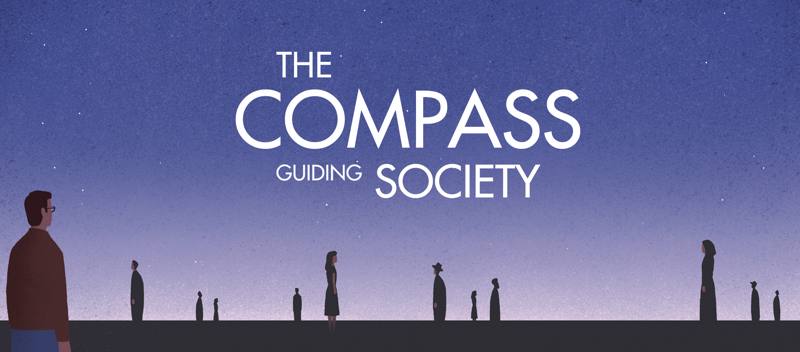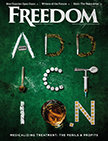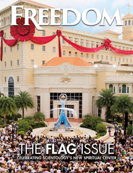
The Compass Guiding Society
More than 40 years ago, Scientology Founder L. Ron Hubbard crafted an article that would prove prophetic. Titled “Religious Influence in Society,” the piece eloquently captured the crucial role that religion plays in any society and how that moment in history augured an American culture at a crossroads in terms of its moral and literal decay.
Mr. Hubbard predicted that the relentless attacks on organized religion that had gone on for the past century or so were likely to continue as long as spirituality was dismissed as the “opiate of the masses.” Although those words are associated with Karl Marx, Mr. Hubbard noted that they had been embedded in popular culture, and that broad swaths of the public regarded religion as “unscientific, that it is primitive; in short, that it is a delusion.”
Beneath such assaults was a more fundamental target: the basic spiritual nature of Man. Mr. Hubbard vigorously opposed such thinking, arguing: “This black propaganda may have been so successful that maybe you no longer believe you have a spiritual nature. …Convince a man that he is an animal, that his own dignity and self-respect are delusions, that there is no ‘beyond’ to aspire to, no higher potential self to achieve, and you have a slave.”
Mr. Hubbard described the new radical thought that Mankind is an animal without a spiritual nature as “totalitarian materialism.” It might today be seen as the forerunner to a new atheism movement that labels any spiritual belief as an aberration, that science trumps religion, and that the two are mutually exclusive.
In his article, however, Mr. Hubbard made the point, “Let a man know he is himself, a spiritual being, that he is capable of the power of choice and has the right to aspire to greater wisdom and you have started him up a higher road.”
These define the very underpinnings of the Scientology religion and the Church’s strong belief in all religions working together and respecting the rights of others. Scientologists well recognize that, as Mr. Hubbard wrote, the most critical point of attack on a culture is its religious experience. “Where one can destroy or undermine religious institutions then the entire fabric of the society can be quickly subverted or brought to ruin.”
Why is this the case? L. Ron Hubbard points out that it was because the removal of religion’s influence shifts the entire definition of public morality, crime and toleration/intoleration onto the State. The State assumes godlike powers—we know the terms as “welfare state” and “police state.” But this strategy hardly ever works, because “morality, integrity and self-respect not already inherent in the individual, cannot be enforced with any great success.
“Only by a spiritual awareness and inculcation of the spiritual value of these attributes can they come about,” Mr. Hubbard continued. “There must be more reason and more emotional motivation to be moral, etc., than threat of human discipline.”
When a culture has entirely fallen away from spiritual pursuits into materialism, there must be a great effort made by people to demonstrate they are a soul and not a material animal. It is only from this perspective and realization of their own spirituality that individuals can get more in touch with God as they understand God—and thus become more themselves.
Mr. Hubbard also expresses in his essay that “Science in itself can become a new faith, a brave new way of overcoming anxiety by explaining things so there is no fear of God or the hereafter. Thus science and religion are not a dichotomy (pair of opposites). Science itself was borrowed from ancient religious studies in India and Egypt.”
This is a key point in fitting Mr. Hubbard’s article into a contemporary context. To be sure, scientists are too often cast today as the enemies of religion, the point made that one is either spiritual or materialistic—and that science and superstition naturally clash. But Mr. Hubbard told us this was in fact erroneous.
In his essay, he shows his deep concern for the dismissal of religious practice itself. He theorized that too much study had been given to believing religion was primitive by its nature, something that modern cultures could jettison without fear of consequence.
“The truth of the matter is,” Mr. Hubbard wrote, “that at no time is religion more necessary as a civilizing force than in the presence of huge forces in the hands of Man, who may have become very lacking in social abilities emphasized in religion.”
In this increasingly technical and materialistic age, the need to protect and maintain religious freedom for all Mankind is greater than ever before.





























